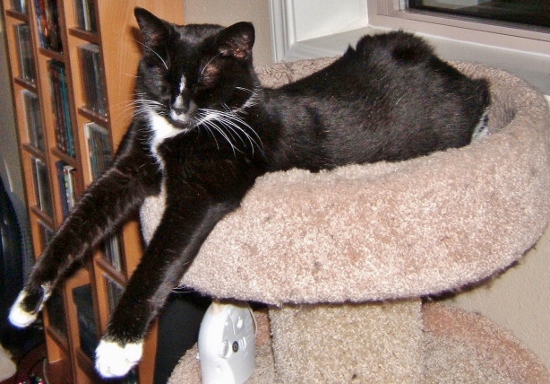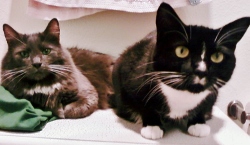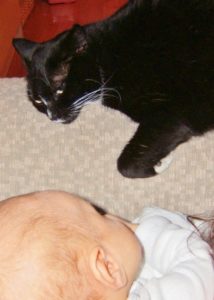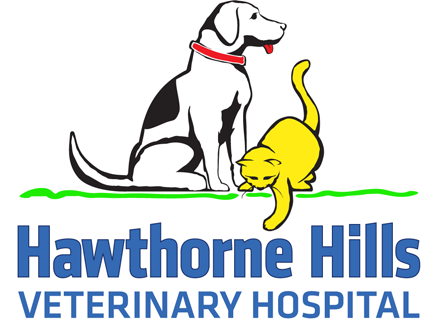
Our Seattle vets explain the importance of keeping your cat regular: Exploring constipation in cats
The Veterinarians at Hawthorne Hills Veterinary Hospital in Seattle have chosen Stella to be our Pet of the Month for October. Stella is a 9 year old Manx cat who has recently had some trouble keeping her bowel movements regular, resulting in a very uncomfortable situation.
Stella always seemed to have irregular bowel movements, alternating between hard stools and diarrhea. However, in early September her stool pattern became even more irregular when she had a bout of diarrhea followed by a lack of stool production for almost a week. After 6 days of no stool production, she became lethargic and started to vomit up her food. At this point she was taken to Hawthorne Hills Veterinary Hospital in Seattle, Washington where Dr. Shawna Wedde discovered that Stella’s colon was large and distended with firm feces. Dr. Wedde suspected that Stella was feeling ill because she was heavily constipated.
 Constipation can be caused by a number of things, such as pelvic injuries, dehydration, masses in the abdomen, colon foreign bodies, and even nerve disorders (which are common in Manx cats). For these reasons and to determine the extent of her colon distention, x-rays were taken of Stella’s abdomen. The x-rays showed a very large feces-filled colon and a normal abdomen and pelvis. Luckily, no evidence of masses or foreign bodies were seen. Bloodwork also showed that Stella had no evidence of kidney disease or other diseases that could cause her to be dehydrated.
Constipation can be caused by a number of things, such as pelvic injuries, dehydration, masses in the abdomen, colon foreign bodies, and even nerve disorders (which are common in Manx cats). For these reasons and to determine the extent of her colon distention, x-rays were taken of Stella’s abdomen. The x-rays showed a very large feces-filled colon and a normal abdomen and pelvis. Luckily, no evidence of masses or foreign bodies were seen. Bloodwork also showed that Stella had no evidence of kidney disease or other diseases that could cause her to be dehydrated.
Stella was admitted to the hospital for fluids and enema treatments. To Stella’s (and Dr. Wedde’s) chagrin, Stella needed to have not one, not two, but three enema treatments to clear out her colon. After the final enema, Stella began to pass stools on her own and felt much better. To prevent this unpleasant situation from occurring again, Stella is now eating a wet food diet with the addition of canned pumpkin for fiber and receives stool softener as needed to help stools pass comfortably.
 Constipation can be prevented by careful monitoring of stool consistency and regularity. If stools become too dry or infrequent, a stool softener or a high fiber diet may be needed to help the stools pass. To prevent your kitty from needing an enema, we encourage you to talk with your veterinarian about your kitty’s stool consistency and regularity.
Constipation can be prevented by careful monitoring of stool consistency and regularity. If stools become too dry or infrequent, a stool softener or a high fiber diet may be needed to help the stools pass. To prevent your kitty from needing an enema, we encourage you to talk with your veterinarian about your kitty’s stool consistency and regularity.
To learn more about constipation in our feline friends, click on the following links:
Constipation and Megacolon:
http://www.veterinarypartner.com/Content.plx?P=A&S=0&C=0&A=634
Constipation in Cats:
http://veterinarycalendar.dvm360.com/causes-and-therapy-constipation-cats-proceedings

